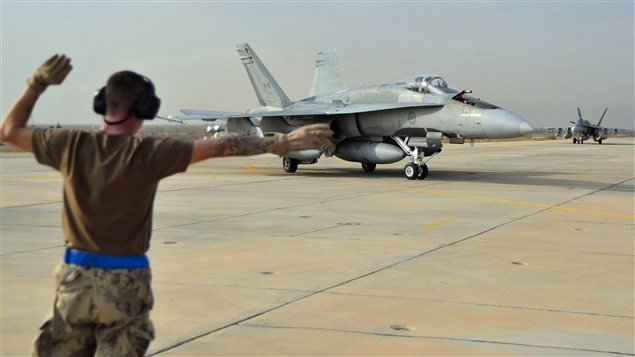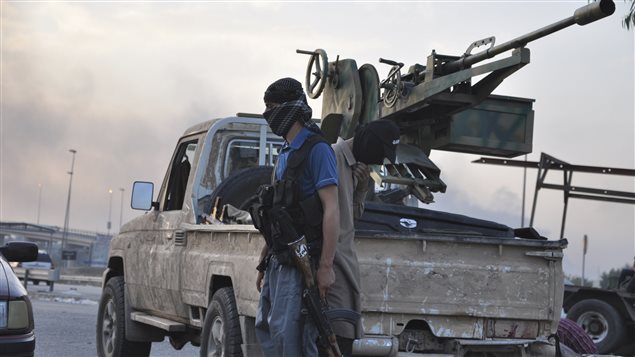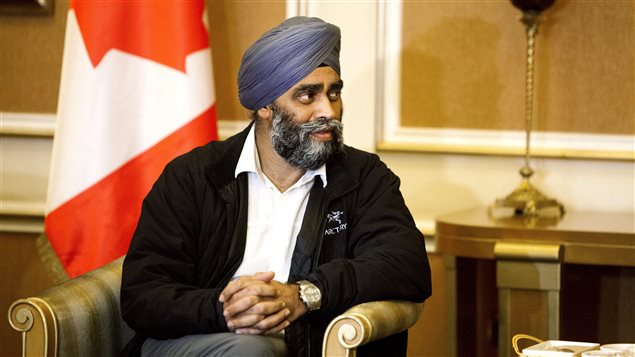Canada and its allies need a much better analysis of the political situation in the world’s hotspots and have to learn from previous mistakes to prevent the emergence of radical organizations that take advantage of power vacuums left by the Western-backed toppling of dictators, said Canada’s defence minister Monday.
Speaking to reporters on the phone from Irbil, the capital of Iraqi Kurdistan, Harjit Sajjan said recent events in Afghanistan, Libya, Syria and Iraq showed the coalition needs to get better at looking at emerging threats before they get to a level “where we have to put coalitions together to get involved in the fight.”
“We need to start looking at the early signs of potential grievances that could lead to radical organizations taking advantage of disenfranchised populations and start their recruitment,” Sajjan told reporters.
Getting first-hand experience

Sajjan said the aim of his visit to Iraq was to see the Canadian troops stationed in the Kurdish areas of northern Iraq and get a first-hand experience and a better understanding of the situation on the ground.
Sajjan, a former police officer and a military commander with extensive experience in Afghanistan, toured the front lines in the war against Islamic State militants on Monday and met with Kurdish military commanders and Canadian special forces who repelled last week’s major offensive west of Irbil.
He said the issue of the Liberal government’s plan to withdraw Canada’s six CF-18 fighter jets did not come up in conversations with either Iraqi officials in Baghdad or the Kurds.
Instead, Sajjan said they discussed how Canada can refocus its military commitment with a beefed up training mission. He said Canada has some military capabilities such as integrated targeting systems that could be very useful in the fight against Islamic State militants.
Getting the big picture

But before Canada commits more resources to the fight, there needs be a much better understanding and analysis of not just country-based issues, but regional based issues and how they interlink with other problems, Sajjan said.
“It’s like a big organized crime group with tentacles and reach,” Sajjan said. “They are not looking at jurisdictions just like any terrorist organization. We need to be constantly ready and looking at when do something are we taking it out or are we displacing it? And if we are going to displace it, we need to be ready where they are going to be.”
In addition, Western countries must be much better prepared when backing insurgencies or popular movements to remove regional strongmen and dictators, Sajjan said.
“Are we creating a void? Who is going to fill that void? What’s going to fill that void? What are the potential things,” Sajjan said. “We need to be constantly doing that type of analysis.”
And once policy makers have a better understanding of the social fabric that includes the radical groups, the political situation, economic and organized crime and how they are all linked together, then they can figure out what type of capabilities to bring to the table, Sajjan said.
Ounce of prevention
“We need the wide spectrum of counter-terrorism measures all the way down to what development does,” Sajjan said.
Regrettably, talking about development is sometimes being equated with being soft on terrorism, he said.
“Well, sometime that approach of keeping people’s lives better and young kids working, especially in Africa, is actually preventing radicalization,” Sajjan said.
Policy makers need to get beyond the current threats to a deeper analysis, to prevent problems from happening, he said.
“I’d rather make sure that things are good than having to get things wrong politically where we have to put our men and women in the harm’s way in the conflict zones,” Sajjan said. “At the end of the day what we really need to do, we need to fight smarter.”
Sajjan said Islamic State expansion in Iraq offers a very good illustration of how an earlier political intervention to address some of the grievances of the country’s Sunni Arab minority might have brought a different outcome.
“Those grievances because they were left unaddressed , the radical organization came and took advantage of it and their ranks grew in size,” Sajjan said. “These are the same reoccurrences, we saw the patterns in Afghanistan, you see it in places like Africa, the indicators are literally right in front of us and sometimes a political solution early on, putting pressure can prevent these things from happening.”
It’s paramount that the coalition fighting ISIS doesn’t create a political situation that is conducive to the creation of another generation of Al-Qaeda, Sajjan said.
“And by the way, while we do this, we can never forget as I mentioned earlier, the reaches into other parts of the region,” he said. “So while we look at the current one, we need to be ready for preventing any other future conflicts.”







For reasons beyond our control, and for an undetermined period of time, our comment section is now closed. However, our social networks remain open to your contributions.